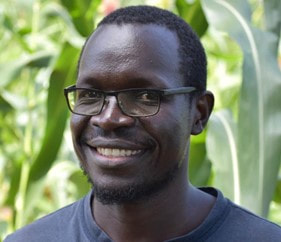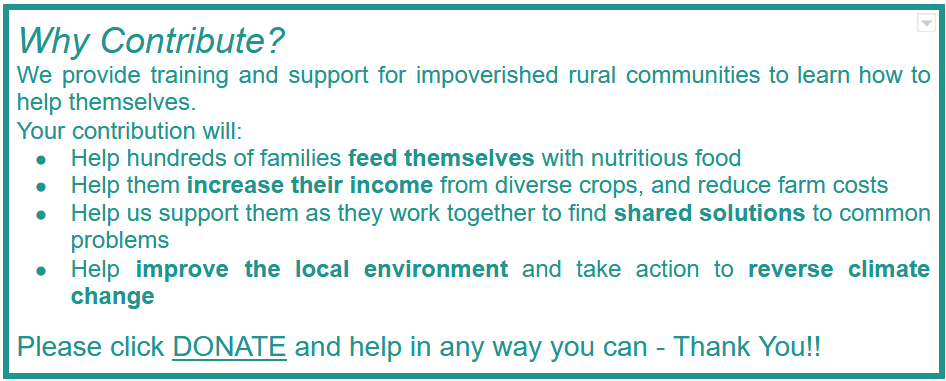Fundraising Success for Phase 3 in Kisa West, Kenya
As our third and final pilot project gets started, training 30 lead farmers in Kisa West, Kakamega County, Kenya, we’re truly delighted to share with you that we now have commitments to meet the full budget for this two-year project!!!
Many thanks to all our committed supporters, and especially to the Zegar Family Foundation for their donation of $15,000 which closed the gap on our funding target. It’s a huge bonus to go into this project with all the funding in place, and a great affirmation of our work with the farmers in Kenya and Uganda.
A HUGE THANK YOU TO EACH AND EVERY ONE OF YOU WHO CONTRIBUTED!!
Many thanks to all our committed supporters, and especially to the Zegar Family Foundation for their donation of $15,000 which closed the gap on our funding target. It’s a huge bonus to go into this project with all the funding in place, and a great affirmation of our work with the farmers in Kenya and Uganda.
A HUGE THANK YOU TO EACH AND EVERY ONE OF YOU WHO CONTRIBUTED!!
News from BEU as their Phase 2 permEzone Pilot nears completion
We started the permEzone pilot program back in 2017: a deliberately slow and careful process of working with different farming communities to develop the program and evaluate the core principles that underlie our work.
Just as our third and final pilot project gets started in Kisa West, we are drawing our second pilot project in Sanje, Uganda to a close.
With the invaluable experience of these three pilots to draw on, we are now preparing the ground for a major process of transformation as full ownership of the program is embodied in a new organization in East Africa that will take this work to a whole new level. This process will be the focus of future newsletters.
Meanwhile, this Newsletter focuses on the great achievements of the team at BEU and the farmers they’ve been supporting as the team comes to the end of the 18-months-long "support" stage of the project, and the farmers build their new community of practice in Sanje.
Just as our third and final pilot project gets started in Kisa West, we are drawing our second pilot project in Sanje, Uganda to a close.
With the invaluable experience of these three pilots to draw on, we are now preparing the ground for a major process of transformation as full ownership of the program is embodied in a new organization in East Africa that will take this work to a whole new level. This process will be the focus of future newsletters.
Meanwhile, this Newsletter focuses on the great achievements of the team at BEU and the farmers they’ve been supporting as the team comes to the end of the 18-months-long "support" stage of the project, and the farmers build their new community of practice in Sanje.
We have a funding gap of $4,000 to cover the costs of the final three months of the project in Sanje - please help if you can!!
Farmers working with BEU see the impact
At the 21-month stage of the two-year project in Sanje, Charles Mugarura updates us on the progress being achieved by the farmers.
That stage of the project was focused on supporting the farmers as they developed their practical understanding of using the permaculture design process to transform their lives, implementing the model farm designs created during the three-month training, and providing extension support for the growing community of Sanje farmers as they fine-tune their initial farm designs.
1. A growing community of practice:
The Sanje Farmer to Farmer permaculture program is supporting smallholder farmers in their community in a process of cohesive community rebuilding based on mutually beneficial values; learning and using permaculture principles together, overcoming daily challenges that include food insecurity, lack of land, growing waste and extreme poverty. As well as increasing their capacity to grow useful crops, they are introducing resilient practices on their land and surroundings to increase natural resources and biodiversity.
2. Recruitment growth - now at 198 members:
Recruiting and extension work with new members has been a key success for the Sanje farmers. Despite all the challenges caused by Covid19, the BEU team witnessed a steady increase in the number of farmers registered and engaged with the lead farmers on each visit.
3. Increased food production:
Short term production of vegetables, including beans, maize, cabbages, and eggplants, has been a continued success, despite the challenges of an inconsistent water supply.
4. Strengthening the local economy:
The farmers committee is working to formalize the farmer to farmer education program, and attracting peer to peer farmer self-managed loans. In addition to an increase in savings, the 2020 cycle savings were distributed among farmers, with the 2021 round at 6,000,000 Uganda shillings (usd1,600).
5. Challenges: The main challenges the farmers currently face can be summarized as:
Record-keeping: some farmers have abandoned record-keeping, mainly due to literacy problems, which has compromised the completeness and accuracy of program-related data.
Access to capital: many aspects of the farmers’ designs remain a dream because of low capital to acquire items such as biogas units, solar, water systems, means of transport, and seeds. This is exacerbated by low crop prices that leave no room for profit or scope for savings.
Covid-related: this has been very challenging for the farmers due to the prolonged lockdown, with businesses and markets being closed.
That stage of the project was focused on supporting the farmers as they developed their practical understanding of using the permaculture design process to transform their lives, implementing the model farm designs created during the three-month training, and providing extension support for the growing community of Sanje farmers as they fine-tune their initial farm designs.
1. A growing community of practice:
The Sanje Farmer to Farmer permaculture program is supporting smallholder farmers in their community in a process of cohesive community rebuilding based on mutually beneficial values; learning and using permaculture principles together, overcoming daily challenges that include food insecurity, lack of land, growing waste and extreme poverty. As well as increasing their capacity to grow useful crops, they are introducing resilient practices on their land and surroundings to increase natural resources and biodiversity.
2. Recruitment growth - now at 198 members:
Recruiting and extension work with new members has been a key success for the Sanje farmers. Despite all the challenges caused by Covid19, the BEU team witnessed a steady increase in the number of farmers registered and engaged with the lead farmers on each visit.
3. Increased food production:
Short term production of vegetables, including beans, maize, cabbages, and eggplants, has been a continued success, despite the challenges of an inconsistent water supply.
4. Strengthening the local economy:
The farmers committee is working to formalize the farmer to farmer education program, and attracting peer to peer farmer self-managed loans. In addition to an increase in savings, the 2020 cycle savings were distributed among farmers, with the 2021 round at 6,000,000 Uganda shillings (usd1,600).
5. Challenges: The main challenges the farmers currently face can be summarized as:
Record-keeping: some farmers have abandoned record-keeping, mainly due to literacy problems, which has compromised the completeness and accuracy of program-related data.
Access to capital: many aspects of the farmers’ designs remain a dream because of low capital to acquire items such as biogas units, solar, water systems, means of transport, and seeds. This is exacerbated by low crop prices that leave no room for profit or scope for savings.
Covid-related: this has been very challenging for the farmers due to the prolonged lockdown, with businesses and markets being closed.
Stage Four - Consolidation
Stage four of the pilot project will consolidate the farmers’ extension program. This final three-month stage of the project is absolutely critical to consolidating BEU’s long-term market strategy and commitment, ensuring that the community structures are in place to help the community of Sanje meet the challenges of finding markets for what they produce.
BEU is already preparing a new agreement with the farmers so that they can continue to work with and support this community long after the two-year permEzone pilot has been completed. The Farmers’ Cooperative and BEU permaculture group will continue their fight against poverty, creating market channels for the farmers’ produce, helping to command better prices both locally and internationally.
By demonstrating that permaculture farming and access to fair markets can build eco-social resilience, the permEzone program in Uganda will continue to inspire people’s interest to understand permaculture design. The Sanje farmers are a self-managed group in control of their own development process creating transformative changes. They are building community unity as they solve problems together, share their skills and experiences, including literacy skills, and are benefiting the entire community.
BEU is already preparing a new agreement with the farmers so that they can continue to work with and support this community long after the two-year permEzone pilot has been completed. The Farmers’ Cooperative and BEU permaculture group will continue their fight against poverty, creating market channels for the farmers’ produce, helping to command better prices both locally and internationally.
By demonstrating that permaculture farming and access to fair markets can build eco-social resilience, the permEzone program in Uganda will continue to inspire people’s interest to understand permaculture design. The Sanje farmers are a self-managed group in control of their own development process creating transformative changes. They are building community unity as they solve problems together, share their skills and experiences, including literacy skills, and are benefiting the entire community.
“The permEzone pilot program has demonstrated how to produce permaculture farming families and communities.”
Please support this invaluable program and help the farmers in Sanje benefit from this final key stage of consolidation to complete their two year’s engagement with the permEzone pilot program –







 RSS Feed
RSS Feed